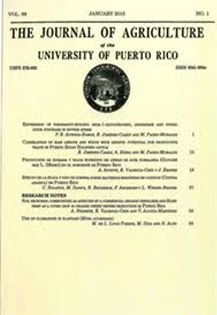Abstract
The effect of supplementation with Aspergillus oryzae and A. niger fermentation products and digestive enzymes on weight gain, growth, and health of Holstein (n=11) and Jersey (n=9) calves was evaluated. All calves, individually housed, were fed unpasteurized waste milk at 0600 (2 L) and 1800 (2 L) for 49 days. All calves were fed ad libitum a calf starter that contained 18% CP; 2.5% fat; 8% CF; 14% ADF; 1.5% Ca; 0.5% P; 0.20 mg/kg Se; 2,273 IU/kg vitamin A; and 66 g/Tm of Lasalocid. Treated animals (five Holsteins and four Jerseys) were fed 2 g of commercial mixture of A. oryzae and A. niger fermentation products and the digestive enzymes α amylase, pectinase, endoglucanase, β glucanase, xylanase, and mannanase. Weight and height were recorded weekly using a Nasco© measuring tape and measuring stick, repectively. There was no interaction of treatment by breed by period (P=0.9636). Treatment did not affect weight gain across periods (P≥0.7215). As expected, Holsteins were heavier than Jerseys (P=0.0284) and both breeds increased in weight over time (P<0.0001). Treatment did not affect the height at the hip (P=0.7971) or withers (P=0.4248). Holstein’s height at the hip for the treatment group (HT) was 80.8 cm ± 2.31 at 49 days and 80.5 cm ± 3.25 for the control group (HC). Jersey treatment group (JT) ended with 85 cm ± 1.98 whereas the control group (JC) ended with 82.1 cm ± 2.17 at the hip. Height at the withers for HT measured 75.3 cm ± 2.62 compared to 80.5 cm for HC. Moreover, calves in JT at the end of the experiment measured 79.9 cm ± 1.23 compared to JC 76.7 cm ± 2.59. Health status did not benefit from the supplementation of A. oryzae and A. niger in combination with enzymes (P=0.1444). Supplementation with A. oryzae and A. niger fermentation products and digestive enzymes did not increase weight gain, growth, or health status in Holstein and Jersey calves fed waste milk under the tropical conditions in Puerto Rico.

